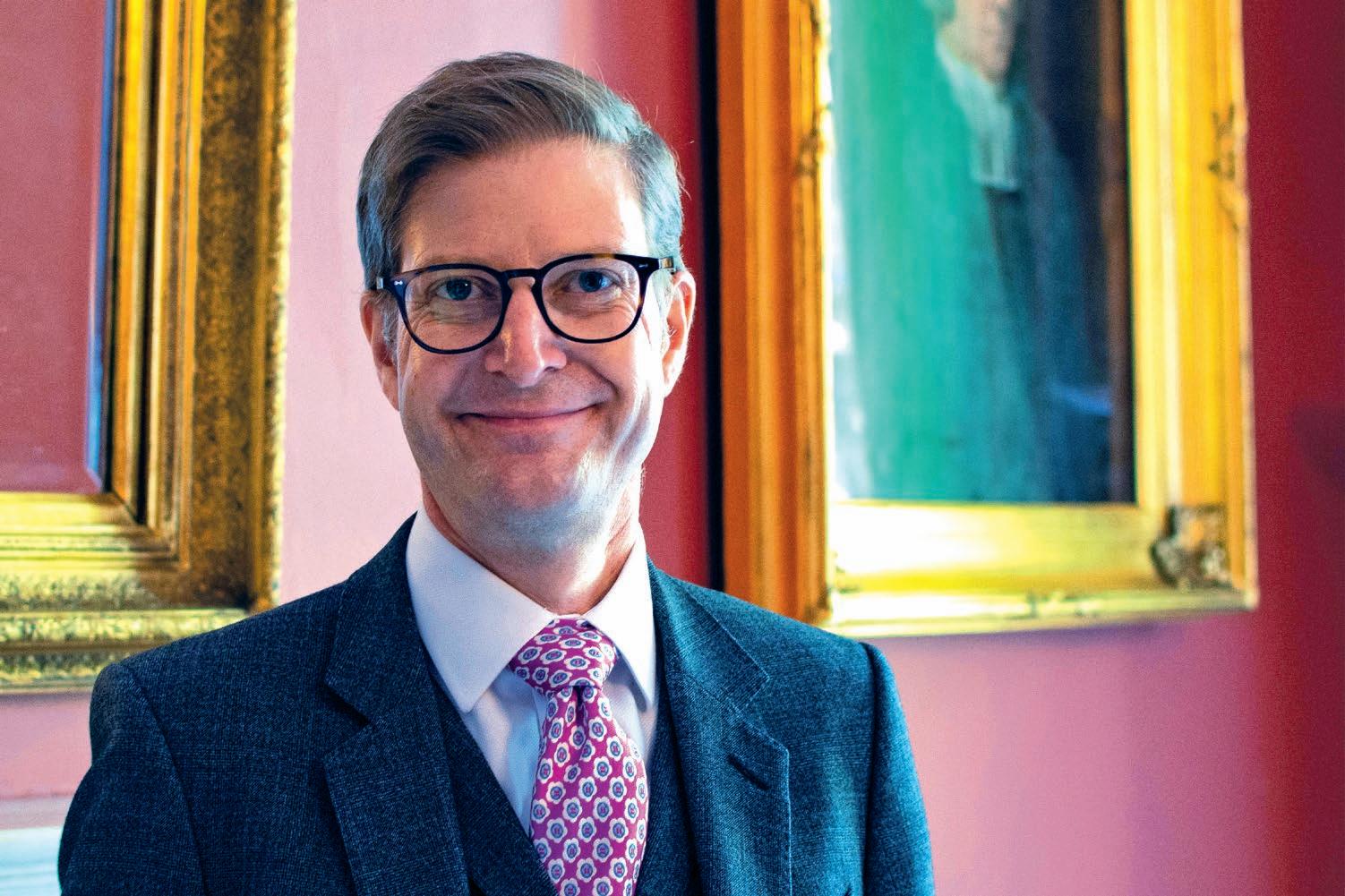
17 minute read
Interview with new Head Master, Dr Gary Savage
Written by Rhiannon Jones-Hopkins
The Elizabethan Club ran a virtual ‘Meet the Head Master’ event in February of this year. It was hosted by Gavin Griffiths (WW, 1967-72 and Former Staff) who asked Dr Savage questions on behalf of Old Westminsters. For those OWW who were unable to attend the event, below is a partial transcript edited for clarity of reading. After the event, OWW were asked to submit any follow up questions, which Rhiannon Jones (Alumni Relations and Engagement Manager) put to Dr Savage in April of this year. Questions of a similar nature were combined so may not have been asked exactly as submitted.
Advertisement
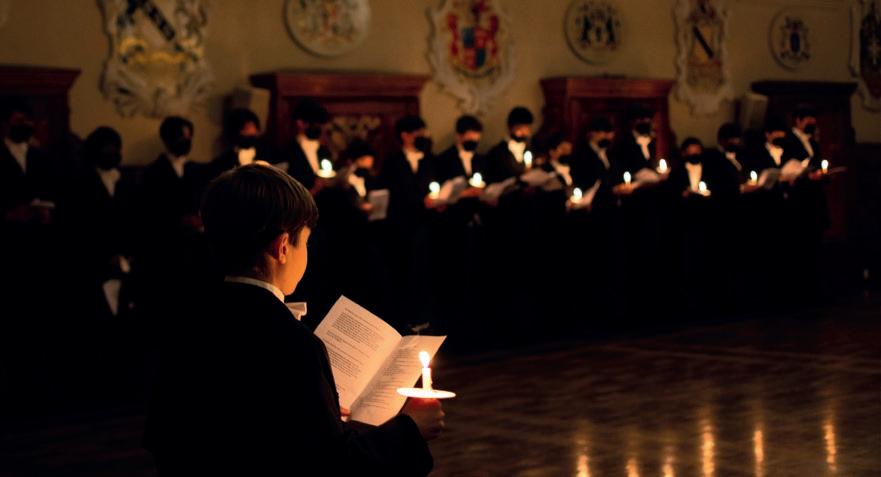
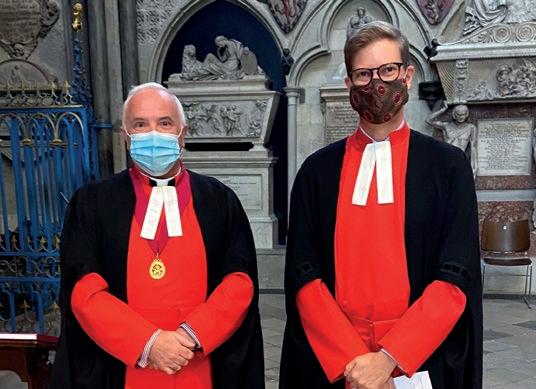
Top: Gary Savage with The Right Revered David Hoyle, Dean of Westminster Below (left): Induction of Queens Scholars, 2020 Below (right): Little Commem, 2020

You left Westminster in 2010 having been Under Master for four years, and ten years later you returned as Head Master. What brought you back to Westminster? What’s changed in the last decade?
It was an easy thing to decide to apply to return as Head Master because it’s a school I love. I had a wonderful four years here as Under Master, I felt the School suited me, I hope I suited it, and I still feel that’s the case. In many ways it hasn’t changed; many of the people and of course buildings are still the same, as is all that is generated by the interaction of those places, spaces and faces. It has changed in other ways of course. We are constantly evolving and learning (particularly from our mistakes) and therefore, hopefully, improving. Above all though, my overriding sense of Westminster as I return as Head Master is that it is perhaps a slightly kinder place, but without having lost any of its intellectual spice or energy. That, to me, is a very happy development. It is wonderful to be back! What specifically do you love about Westminster, and why did it suit you in particular?
It suits me because I like ideas, discourse and energy. You find that in many good schools of course. But the depth of rigour of that, coupled with a degree of non-conformity, healthy scepticism and questioning, is quintessentially Westminster.
What do you most enjoy about being Head Master?
I love the variety and all the interactions of being Head. One of the reasons I love Westminster is that Yard is a fulcrum – it is a meeting place, you can bump into colleagues and pupils and you can have genuinely interesting conversations. On the micro level I like those interactions and the fact that it’s an environment in which we all continue to learn – I certainly learn something every day. At the macro level I find professional satisfaction in taking an institution and helping it to be even better. I completed ten years as Head at Alleyn’s and it was in very good ➽

Chengdu Westminster,School (CGI)
shape when I got there, but I hope it was in even better shape afterwards thanks to the efforts of all my colleagues, whom it was my job to lead and encourage. Along the strategic way it’s those daily interactions with people and ideas and that make the job fresh and interesting every day. That’s why I think all teachers stay in the profession, inside and outside the classroom; it’s rich, unexpected, enjoyable and stimulating.
What would you change at Westminster?
If I could change anything right now, Westminster would have the ability to be fully needs-blind. We have a sincere ambition, but we don’t yet have the means. So if I could make any change right now it would be to have an endowment of sufficient size to enable us to meet that aspiration in full. That will, in truth, take some time to achieve, but we are determined to do so.
Three out of the last six Head Masters have been historians! Do you have much classroom contact?
There are a lot of theories as to why that might be. Perhaps we are simply good at talking! Whatever the reason I have always taught History and I’ve never not taught in my 25+ years in schools. I currently teach a course in German History. I have a class of 6th formers and it is certainly a highlight of my week. Of all the wonderful pupils that I’ve taught over the years, the Westminster classroom is very special; the pupils are extraordinarily quick, full of ideas with a willingness to listen and a desire to be heard.
What are your thoughts about the future of private schools given both the recent press about Oxbridge, and increasing fees?
I went to a comprehensive school and I have friends and colleagues across a range of very different institutions, both independent and maintained. What do we have in common? We’re educators, we care about children, we love spending time with them and we want to help them to learn and to grow and to be good people. However, in an independent school what I cherish is the fact we have the freedom to develop an educational experience which we think best suits our pupils and enables them to flourish. However, if you’re independent you have to charge fees; this is not an end in itself, nor a good, but a means to an end – the end being educational independence. I value that independence and I think it must be defended. It is good there is a plurality of options, that parents and children have choice and it’s important that there are independent voices within the educational debate. It is also vitally important that those independent schools, wherever possible, raise the monies to help them ensure that it’s not only those who can pay fees that attend but anyone for whom that school would be the right place to live, learn and flourish.
You have emphasised the classroom, but what role does sport have at a school like Westminster, do you see it as a core part of the education?
Yes I do! I think that any good school must have a properly holistic curriculum, as Westminster most certainly does. Our curriculum review will look at what

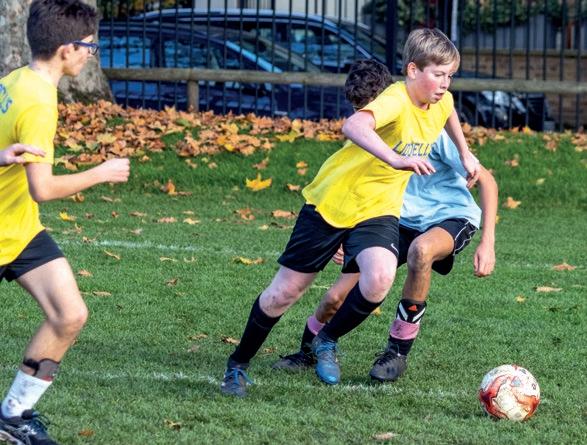
House Football we are teaching inside and outside the classroom and at how they interrelate, so that the children are educated holistically and are able to make interesting connections between disciplines and activities. We hope to educate our pupils not only academically, but also physically, spiritually, philosophically and practically. It has to be that way to prepare them for life as it will be lived in any century, including the 21st. So I really care about sport. I’ve been down to Putney – CD Riches shoved me in a boat and I was motored about regally on the Thames watching the pupils go through their paces and it was wonderful! I’ve already watched House football, I’ve watched some fencing and rock-climbing and cricket, you name it – I cherish all of that.
Could you explain in more detail the relationship between Westminster and the new Chengdu Westminster schools in China?
The project was up and running when I arrived last September, it is a scheme to open, in time, a series of schools in China which carry the Westminster name and have some of the Westminster DNA in them, which we support through advice on the curriculum and pedagogy. Apart from the educational value of this in its own right, we hope this relationship will help us to realise our ambition of becoming fully needs-blind. They are bilingual schools, not international schools, so they are for Chinese nationals. That means the Chinese curriculum is taught up until the age of 15, after which the schools can adopt international curricula, such as IGCSEs and international A Levels. But the whole point is that both in the compulsory Chinese element of the curriculum, and the post-15, the schools will be characterised by a Westminster pedagogy. In other words, those things which I have been celebrating about the Westminster classroom – dialogue, debate, questioning, inculcating a healthy scepticism and the rigorous use of evidence to answer questions and pose new ones. ➽
Is it difficult to picture the kind of classroom interaction that you prize working in a more directed educational system?
Our partners in Chengdu know our ethos and approach – it’s been a key driver from the project’s inception. Rodney Harris, former Housemaster of Purcell’s and Deputy Head (Academic), is the founding Head of Chengdu Westminster so he knows exactly what our pedagogy looks like and he will promote and enshrine it as something to be cherished. There is lots of dialogue between the schools to make sure this happens. More generally, as an educator I instinctively feel it is better to engage than not to do so, particularly in view of what we are trying to add to the educational landscape in China, which we hope is distinctive. We will see how it develops – the school hasn’t opened yet. But the aim is to bring a Westminster pedagogy to pupils and teachers in China and to see, through that dialogue and interaction, what we can teach and what we can learn.
Can you speak about the School’s commitment to equality, diversity and inclusion?
It’s a vitally important issue. Obviously, the issues highlighted by Black Lives Matter last year continue to concern us all, and I have valued being part of the Challenging Racism Committee that was established last summer for pupils to share their experiences and thoughts about being pupils of colour at Westminster. One of the reasons I wanted to come and work at Westminster again, was because I know the quality of the discourse amongst the pupils themselves; they speak with great eloquence, insight and sense about how we can do better, how we can make sure the curriculum tells everybody’s story, how the feel of the School can make everybody feel safe and welcome. We have now seen something similar happen with the Westminster Testimonies and Everyone’s Invited, which have highlighted some appalling attitudes and behaviours around gender, sexism
and sexual abuse which need to be tackled too. While Westminster is by no means the only place where such attitudes exist in some quarters, we absolutely have a responsibility to ask serious questions of ourselves and try to formulate responses that will make a positive difference. The independent reviews commissioned by the Governing Body will help us to do that, so that we can build a better framework for equality, diversity and inclusion in the future.
What kind of things do pupils feel the School could do better at?
There are lots of themes that have emerged, and we received some powerful and eloquent letters both last year, around racial abuse, and this year, around sexual abuse. Key themes would be a continuing experience inside and outside the classroom of thoughtless or unkind comments that we need to find a way to tackle so that everyone here can feel safe and secure. Everyone lives their own experience of Westminster and should have the right to do so; whether you’re a pupil, a teacher, or indeed a Head Master, we all have the right to feel respected and welcome here. Part of the answer will be encouraging greater diversity in the pupil and staff body. It’s a pretty diverse school in all sorts of ways, with more women teachers than there used to be and a great variety of pupils of different backgrounds and perspectives, which is excellent. However, representation of the black community is certainly not what it could be, and I am determined to find ways to tackle that. The more diverse a community of teachers and pupils is, the more everyone will feel more at ease and more confident.
What about the curriculum?
Pupils also think that a school’s curriculum says a lot about what it values, and they are right about that; so we need to ask what our curriculum tells us about what we value, how can that be developed to create more diversity, and to give time, respect and credence to other stories and perspectives. That’s one of the reasons

(and there are others) I’m running a full curriculum review next year. History is an obvious case in point here. History has always been misused for political purposes and one of the key tasks for proper historians is to deploy and promote a rigorous evidence-based approach to studying the past which counters propaganda and actually tell a version of the past which is rooted in some kind of documentary proof, however uncomfortable the results. There are lots of stories that are not told, and they are equally valid and important. How can we tell everybody’s story or different stories to create something that is even richer and more textured and more stimulating for clever pupils to get their teeth into and engage with? This is what education is all about, not least here at Westminster.
What is your view on the use of the Elizabethan Club?
Any good school should want to engage with its alumni because they carry the values of the School within them; they know what the School stands for as they’ve experienced it first-hand. That doesn’t mean to say that our values are somehow cast in aspic, they can always be reviewed and revisited; but we need to keep talking to each other so that people like me don’t forget what this School means to generations of Old Westminsters. That dialogue is really important to me. There are also really important and tangible ways that OWW can help the School today; for instance, and perhaps most critically: they can promote The Westminster School Campaign for bursaries and help us to meet people who might be able to help us. There’s a multitude of ways that OWW can engage, but above all I want the entire alumni community to feel valued and cherished because they’ve been through the experience and they know what it means.
*Transcript ends. Follow up questions overleaf* ➽
What plans do you have for the School to impact the community beyond Westminster’s four walls?
It is vital that we build on the brilliant work of the School’s outreach partnerships so far, particularly in London with Grey Coat Hospital School and Harris Westminster. The Platform, Platform+ and Platform Higher schemes are hugely successful examples of working within the community to make a difference, and we shall build on that, too, in the years ahead. I’m interested in the global community too, and I want Westminster to think about sharing ideas, broadening academic disciplines and making connections between them. To that end, we have launched the Horizons programme to connect with other schools and universities around the world (something which Zoom has made much easier) so pupils and teachers can learn from other institutions, gain insight into different approaches and, as the name suggests, widen everyone’s horizons. I am also really excited about the work our Director of Music, Tim Garrard, is doing as Partnerships Lead of the Music Teachers’ Association (MTA). Tim has just set up a partnership between MTA and HMC to help every child access outstanding music education in schools, ‘joining the dots’ to create a national grid of partnership. We mustn’t forget the environmental context either: that is a global agenda which our young people want to commit to and we need to find new ways to support them, and to play our part in promoting a sustainable future.
What are you most proud of in your life and career so far?
I think I feel pride chiefly in process rather than specifics. I am proud of my work in schools over 25+ years, and proud that I have made a commitment to teaching and supporting young people throughout my career. It is something that you learn from every day; no-one ever gets it right every time, certainly I haven’t, and recognising that is important. Whenever you think that you have it mastered, something happens to humble you and you learn something you didn’t even know you Whenever you think that you have it [teaching] mastered, something happens to humble you and you learn something you didn’t even know you needed to learn...
Portraits of Dr Busby (top) and John Locke (bottom) which hang in the Head Master’s office needed to learn. That’s an important lesson for our high-achieving pupils too, of course. On a personal level, I am proud of sustaining relationships and values and an attitude to life that I hope is reflective of my passionate interest in learning, knowledge and understanding. To be completely honest, I am proud of completing my doctorate while running a boarding house; it was a long journey through some of the highways and byways of eighteenth-century France but I got there in the end. But truly my overriding sense of achievement is about keeping it all going, taking people with me and feeling supported by them whilst sustaining those relationships. Oh, and despite a number of good reasons to give up on them, my continued support of Ipswich Town FC!

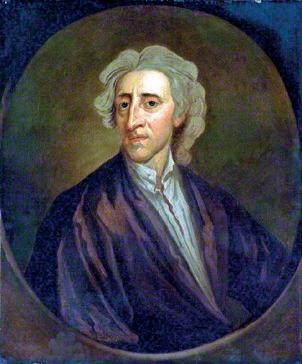
If you could go back in time to one period of history when would it be and why?
I would have to go back to Revolutionary France! That is what my PhD was about and I would love to see how it really was and discover the truth of what really happened, stripping away centuries of misinterpretation and misuse for political purposes of one kind or another. Albeit it would be quite dangerous, as an Englishman and as a German – I could quite possibly lose my head! In that light, it might be safer to re-read Hilary Mantel’s stunning evocation in “A Place of Greater Safety”.
Which three people, alive or dead, would you invite round for dinner? And why?
I think the three people whose portraits hang behind me in the Head Master’s study wouldn’t be a bad place to start. Dr Busby, a great Head Master; Queen Elizabeth, a powerful sovereign who always has my back; and John Locke, an extraordinary philosopher.
What subject would you introduce at Westminster that isn’t already on the curriculum?
I think a good curriculum has a good blend, good interdisciplinary moments, and is thus even greater than the sum of its parts. A really good curriculum needs to be knowledge-rich and needs
Portrait of Queen Elizabeth

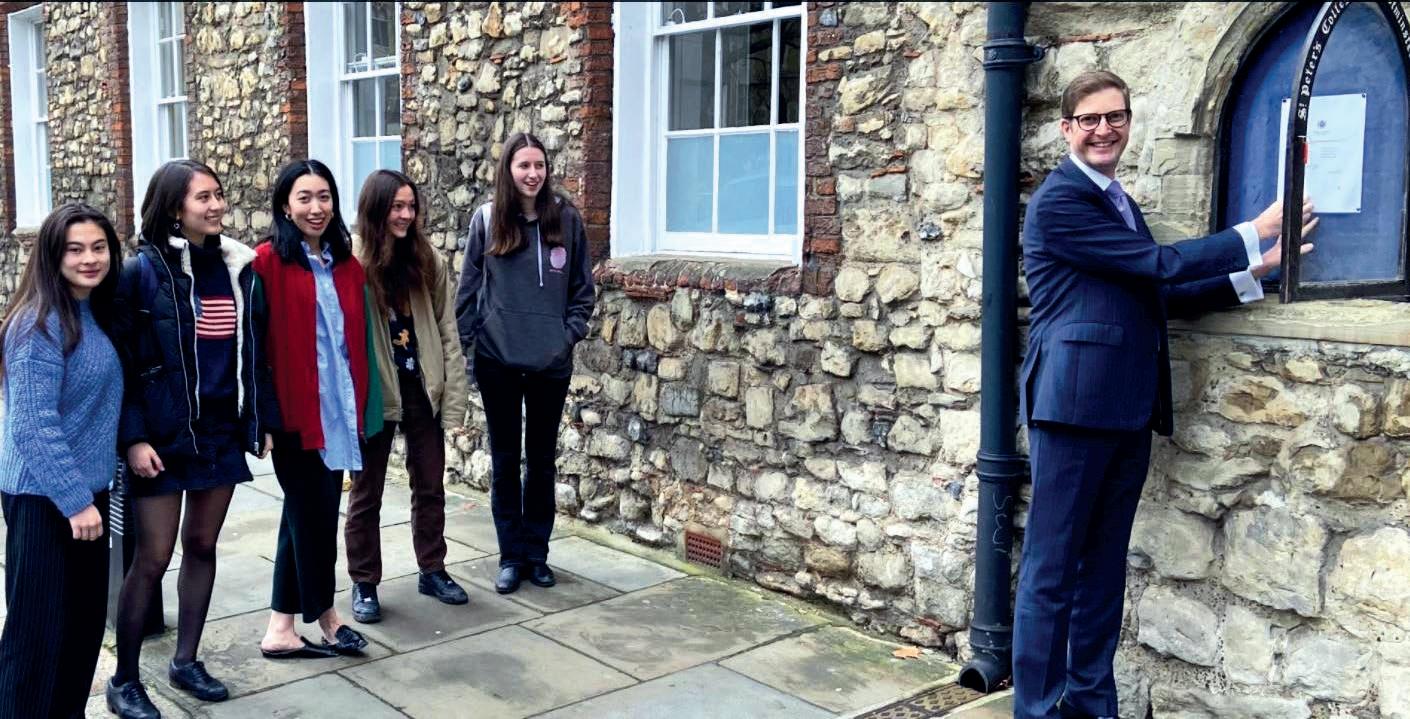
to be deftly curated. We need to teach pupils how to use their own critical thinking skills judiciously and efficiently. So it’s not about a specific subject per se, but making sure that the balance and blend is right. Spotting connections, developing them, finding new ones: this is good practice for scholarly minds. Helping young people to articulate their own questions – and be rigorous in their pursuit of answers – is best practice for teachers. What I would like the upcoming curriculum review to accomplish is to create enough opportunity for inter-disciplinary questions to transcend the best teaching and enable really independent, highlevel learning – and fun!
How would you define ‘thriving’ from the perspective of Westminster School?
For both pupils and teachers to thrive means that they can grow as people – academically, physically, spiritually, both as individuals and as part of their community. A school environment should enable outlooks, capacities, skills and feelings to grow in a way that is sustainable, balanced and healthy alongside the acquisition of knowledge. Everyone should feel respected and therefore invested in the future of Westminster. Sometimes you have to accept something isn’t completely right, to metaphorically prune back the hedges, to replant and re-landscape the School so it can continue to grow healthily. This isn’t easy, but one has to be responsive and sensitive and recognise, as I said earlier, that mistakes will be made and we need to have the humility and courage to learn from them. Ultimately, every individual should be able to feel at home here, valued and respected for who they are and what they bring. That, to me, is to thrive – and I am proud to have been given the opportunity to contribute. Floreat! ■










